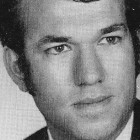Stafford Dean Suggest updates
Stafford Roderick Dean.
Born Kingswood, Surrey, 20 June 1937.
English bass.
Stafford Dean had a notable international career, particularly singing Mozart roles (Figaro, Leporello) in the world's major houses. However his repertoire was far more varied than that suggests. Dean had a lengthy association with Scottish Opera, as well as with ENO and Glyndebourne.
Early career
Stafford Dean studied at the Royal College of Music under Gordon Clinton, and continued to work privately with the bass Howell Glynne and baritone Otakar Kraus. He joined Sadler's Wells in 1964, remaining with the company for the next six years, singing a variety of bass roles in London and on tour. His debut was as Zuniga Carmen, and he soon added parts by Monteverdi (Pluto Orfeo); Mozart (Leporello, Sarastro); Beethoven (Rocco); Rossini (Alidoro); Wagner (Daland); Verdi (Sparafucile, Ribbing, Padre Guardiano); Strauss (Truffaldino) and Puccini (Colline). In 1967 he created the role of Samuel Breze in A Penny for a Song (Bennett). During this period, roles at Glyndebourne included the Magistrate in Werther and Rochefort in Anna Bolena.
His debut at Covent Garden came in 1969, as Masetto, followed by the He-Ancient in The Midsummer Marriage. Major roles he sang at the Royal Opera House in later seasons included Narbal in The Trojans, Leporello, Figaro, Don Alfonso, Rangoni, Gessler (in Guillaume Tell), Bottom, and Alfonso d'Este in Lucrezia Borgia (with Joan Sutherland). In 1987 he sang the Prime Minister in the British première of The King Goes Forth to France by Aulis Sallinen.
Dean also sang Don Alfonso at Glyndebourne and Don Pedro in Beatrice and Benedict at ENO.
Roles with Welsh National included Sarastro and a notable performance as Philip II in Don Carlos.
Scotland
His debut with Scottish Opera came in 1970, as Leporello, and he appeared with the company frequently over the next thirty years, in a wide range of parts (at least eighteen) by a varied list of composers including Monteverdi (Seneca); Mozart (Osmin, Figaro, Leporello, Sarastro); Beethoven (Rocco); Donizetti (Dulcamara, Cecil); Wagner (Titurel); Verdi (King of Egypt); Tchaikovsky (Gremin); Dvořák (Vilém The Jakobin); Puccini (Timur); Strauss (La Roche); Delius (Wapanacki The Magic Fountain) and Stravinsky (Tiresias). He created the double role of Cardinal Beaton and David Riccio in Mary, Queen of Scots (Musgrave 1977), and he also created the King of Portugal in Inés de Castro (MacMillan 1996).
International career
His international work began in 1971 with performances of Leporello in Stuttgart, then at the Munich Festival, both in stagings by Gunther Rennert. He soon afterwards sang in Hamburg, Berlin. Prague and Bordeaux. His career developed rapidly with appearances in most of the major houses, particularly in the roles of Figaro and Leporello, which he sang in Cologne, Hamburg, Munich, Amsterdam, Vienna, Tokyo, San Francisco, Paris and Aix-en-Provence. He also sang Figaro in Chicago (1975) and at the New York Met (1976).
Recordings
Dean's recordings include Abednego in Britten's own recording of The Burning Fiery Furnace. He also recorded Rochefort in Anna Bolena, Monteverdi Madrigals including Pluto in Il ballo delle ingrate, Trulove in The Rake's Progress, Tiresias in Oedipus Rex, the Dark Fiddler in A Village Romeo and Juliet and Pirro in I Lombardi. Vocal recordings include the Mozart 'Coronation' and 'C minor' Masses, both with Colin Davis.
While Inés de Castro was televised by the BBC, the tape has never been made available commercially. However Dean can be seen on DVD due to the televising of the Covent Garden staging of Donizetti's Lucrezia Borgia in 1980. He sings the role of Alfonso d'Este, Duke of Ferrara, with Dame Joan Sutherland as his wife (the title role), Alfredo Kraus as Gennaro and Anne Howells (Mrs Dean at the time) as Maffio Orsini.
Revised February 2020.
Roles in Scotland
- Zuniga a lieutenant of dragoons
-
Carmen 1964
- Count Ribbing a conspirator (Sam)
-
Masked Ball 1965
- Alidoro Ramiro's tutor, a philosopher
-
Cenerentola 1965
Cenerentola 1967
- Sparafucile a professional assassin
-
Rigoletto 1968
- Leporello Giovanni's servant
-
Don Giovanni 1968
Don Giovanni 1970
Don Giovanni 1971
Don Giovanni 1975
Don Giovanni 1976
- Truffaldino a comedian
-
Ariadne on Naxos 1969
- Padre Guardiano Franciscan Father Superior
-
Force of Destiny 1969
- Sarastro High Priest of Isis and Osiris
-
Zauberflöte 1969
Zauberflöte 1970
Zauberflöte 1979
- Figaro the Count's valet
-
Nozze di Figaro 1972
Nozze di Figaro 1973
- Seneca a philosopher, Nero's former tutor
-
Incoronazione di Poppea 1973
- David Riccio
-
Mary, Queen of Scots 1977
- Cardinal Beaton
-
Mary, Queen of Scots 1977
- Osmin the Pasha's overseer
-
Entführung aus dem Serail 1978
Entführung aus dem Serail 1982
- Prince Gremin a retired general
-
Eugene Onegin 1979
Eugene Onegin 1980
- La Roche a theatre director
-
Capriccio 1985
- Tiresias a blind soothsayer
-
Oedipus Rex 1986
- Dulcamara a quack doctor
-
Elisir d'amore 1994
- Lord Guglielmo Cecil Sir William Cecil
-
Maria Stuarda 1994
- Rocco gaoler
-
Fidelio 1994
- Count Vilém of Harasov, a retired general
-
Jacobin 1995
- Timur exiled King of Tartary
-
Turandot 1996
- King of Portugal
-
Inés de Castro 1996
Inés de Castro 1999
Inés de Castro 2001
- King of Egypt
-
Aïda 1999
- Wapanacki an Indian Chief
-
Magic Fountain 1999
- Bass
-
Symphony no9 'Choral' 1999
- Titurel Amfortas' father, former Guardian
-
Parsifal 2000
